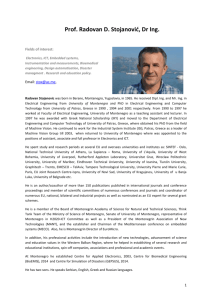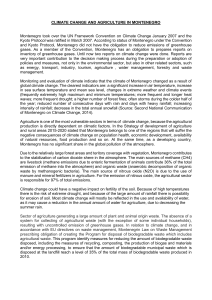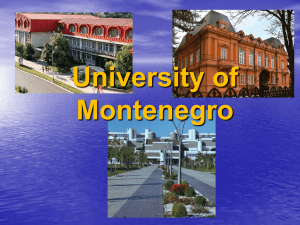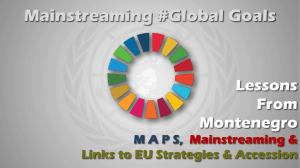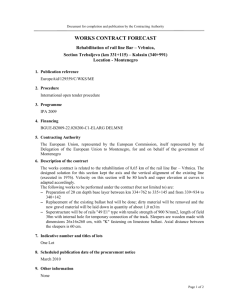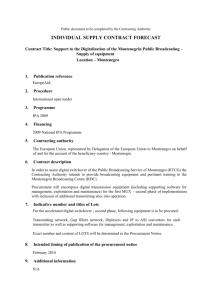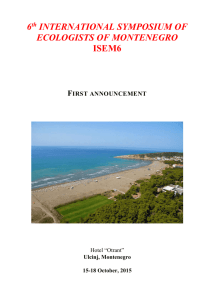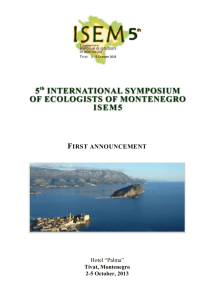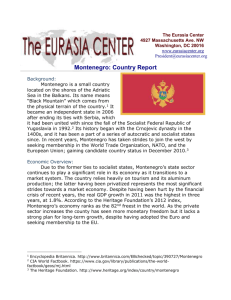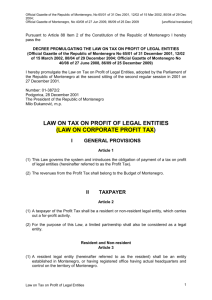Human Rights Action
advertisement
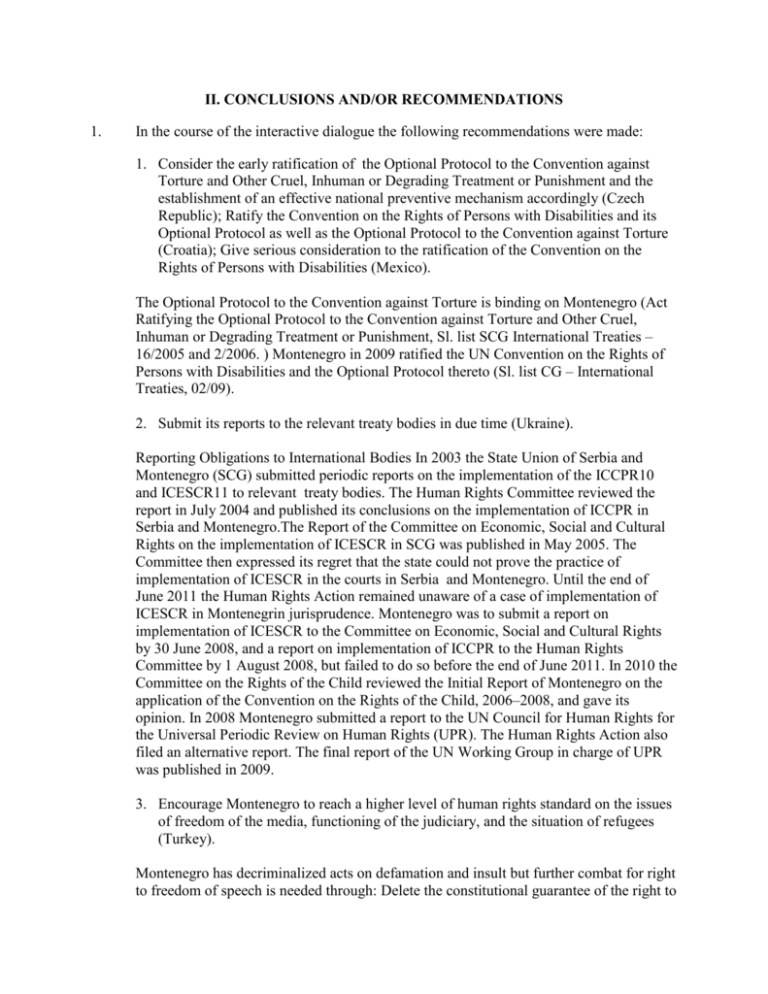
II. CONCLUSIONS AND/OR RECOMMENDATIONS 1. In the course of the interactive dialogue the following recommendations were made: 1. Consider the early ratification of the Optional Protocol to the Convention against Torture and Other Cruel, Inhuman or Degrading Treatment or Punishment and the establishment of an effective national preventive mechanism accordingly (Czech Republic); Ratify the Convention on the Rights of Persons with Disabilities and its Optional Protocol as well as the Optional Protocol to the Convention against Torture (Croatia); Give serious consideration to the ratification of the Convention on the Rights of Persons with Disabilities (Mexico). The Optional Protocol to the Convention against Torture is binding on Montenegro (Act Ratifying the Optional Protocol to the Convention against Torture and Other Cruel, Inhuman or Degrading Treatment or Punishment, Sl. list SCG International Treaties – 16/2005 and 2/2006. ) Montenegro in 2009 ratified the UN Convention on the Rights of Persons with Disabilities and the Optional Protocol thereto (Sl. list CG – International Treaties, 02/09). 2. Submit its reports to the relevant treaty bodies in due time (Ukraine). Reporting Obligations to International Bodies In 2003 the State Union of Serbia and Montenegro (SCG) submitted periodic reports on the implementation of the ICCPR10 and ICESCR11 to relevant treaty bodies. The Human Rights Committee reviewed the report in July 2004 and published its conclusions on the implementation of ICCPR in Serbia and Montenegro.The Report of the Committee on Economic, Social and Cultural Rights on the implementation of ICESCR in SCG was published in May 2005. The Committee then expressed its regret that the state could not prove the practice of implementation of ICESCR in the courts in Serbia and Montenegro. Until the end of June 2011 the Human Rights Action remained unaware of a case of implementation of ICESCR in Montenegrin jurisprudence. Montenegro was to submit a report on implementation of ICESCR to the Committee on Economic, Social and Cultural Rights by 30 June 2008, and a report on implementation of ICCPR to the Human Rights Committee by 1 August 2008, but failed to do so before the end of June 2011. In 2010 the Committee on the Rights of the Child reviewed the Initial Report of Montenegro on the application of the Convention on the Rights of the Child, 2006–2008, and gave its opinion. In 2008 Montenegro submitted a report to the UN Council for Human Rights for the Universal Periodic Review on Human Rights (UPR). The Human Rights Action also filed an alternative report. The final report of the UN Working Group in charge of UPR was published in 2009. 3. Encourage Montenegro to reach a higher level of human rights standard on the issues of freedom of the media, functioning of the judiciary, and the situation of refugees (Turkey). Montenegro has decriminalized acts on defamation and insult but further combat for right to freedom of speech is needed through: Delete the constitutional guarantee of the right to damages for publishing false information, because it may lead to violations of the freedom of expression; Amend the Act on Public Broadcasting Services to ensure the impartiality of the RTCG Council, which is now elected by the Assembly; Reinforce the regular mechanism for overseeing RTCG management by the Council and the State Audit Institution, and continuously inform the public about the possibility of filing complaints and petitions about the quality of the programme to facilitate the transformation of the PBS into an institution of general interest; Amend the Media Act by specifying the standards of “reasonable publication”, “due journalistic diligence”, proportional damage award, protection of privacy and others in ECtHR case law in order to ensure the mplementation of these standards. The Supreme Court adopted a principled position on awarding non-pecuniary damages for violations of honour and reputation via the media, in accordance with the Government Action Plan for the Implementation of the ecommendations in the EC Opinion, but this principled position is not specific enough to facilitate and ensure the implementation of European standards; Reinforce the practice of protecting honour and reputation by exercising the rights to a correction and a reply envisaged by the Media Act. No such lawsuits have been registered in practice, as opposed to a large number of civil and criminal lawsuits over violations of honour and reputation; Privatise the daily Pobjeda as envisaged by the law. This daily was still mostly state owned in late June 2011 although it was to have been privatised in 2003. In the meantime, prevent the management of this daily by party officials and thus reduce the public impression of this public outlet’s bias.; In accordance with international recommendations, an independent body rather than the Ministry of Culture should monitor the implementation of the Free Access to Information Act. Although this Act includes penal provisions, no state agency or its employee has ever been convicted for violations that have obviously been committed in practice. The existence of an independent monitoring body would Conclusions and Recommendations probably have resulted in greater consistency of practice and rapid improvement in actions of state bodies. The NGOs’ experience shows that the authorities often do not act within the statutory deadlines, that their practical implementation of the law is inconsistent and that often, despite the rulings of the Administrative Court, they avoid providing access to information. Particularly concerning was the State Prosecution Office’s decision not to provide any information about cases of human rights violations that have alarmed the public, which was later quashed by the Administrative Court; Uphold by end 2011 draft laws aimed at harmonising the Free Access to Information Act, the Personal Data Protection Act and the Classified Information Act with European standards; reform the Criminal Code provisions on Disclosure of Another’s Personal and Family Circumstances (Art. 197), Harming the Reputation of Montenegro (Art. 198), Harming the Reputation of a Minority Nation or Another Minority National Community (Art. 199) and Harming the Reputation of a Foreign State or International Organisation (Art. 200), which still allow excessive restrictions of the freedom of expression, contrary to international standards. Disclosure of another’s personal and family circumstances via the media, similar means or at a public gathering is punishable by up to 14,000 Euros, or average salaries in Montenegro. The crime of Harming the Reputation of Montenegro (entailing the ridicule of its flag, coat of arms or anthem) still warrants imprisonment and criminal prosecution ex officio. The decriminalisation of Insult and Slander/Libel, conducted in June 2011, would thus be logically completed; Re-establish the Journalistic Self-Regulatory Body to ensure respect and promotion of the journalistic profession in accordance with European freedom of expression standards; Effective investigations into the killings of the daily Dan Chief Editor Duško Jovanović and the driver of assaulted writer Jevrem Brković Srđan Vojičić, and the assaults on journalists Mladen Stojović, Tufik Softić, Željko Ivanović, Mihailo Jovović are crucial both in terms of the freedom of expression and confidence in the rule of law and democratic environment in Montenegro. 4. Pursue the adoption of a general anti-discrimination act and aim at its adoption as soon as possible (Austria); Include, in the draft legislation on the prohibition of discrimination, comprehensive anti-discrimination measures, including on sexual orientation and gender identity (Slovenia). The Anti-Discrimination Act (Sl. list CG, 46/2010) came into force on 14 August 2010. Its adoption was preceded by a public debate in which the authors accepted a number of suggestions by human rights NGOs. The Act is aligned with Montenegro’s international obligations, but it could have been more precise and comprehensive and taken the recommendations of international organisations and the proposals of the domestic NGOs more into account. 5. Include explicit mentions of sexual orientation as a protected category against discrimination in the existing laws on Labour and Employment as well as in the legislation on hate speech and hate crimes (Canada). This recommendation has been accepted please refer to recommendation 4.
